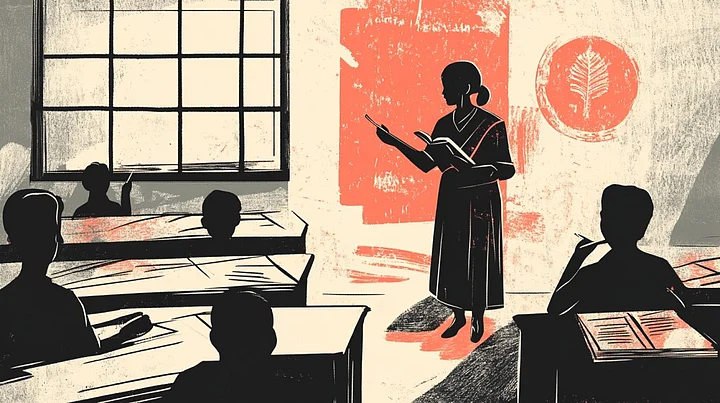India’s education landscape is undergoing a seismic shift. The traditional blackboard is being replaced by interactive whiteboards, lessons are moving to virtual classrooms, and AI is automating assignments and assessments.
The Union Budget 2025-26 has placed significant emphasis on skilling teachers in digital tools, AI-driven assessments, and adaptive learning platforms to keep pace with this transformation. The government’s initiatives, alongside the rapid expansion of EdTech platforms, signal a clear shift toward tech-enabled teaching.
The question now is: Will AI enhance teachers’ roles or make them redundant? And how will classrooms look by 2030?
From Chalk to Chatbots: The Rise of AI in Indian Classrooms
Technology adoption in Indian schools has skyrocketed.
Interactive whiteboards are replacing traditional blackboards in thousands of classrooms.
Virtual classrooms saw a surge post-2020, and over 75% of schools now incorporate some form of digital or blended learning.
AI-assisted grading tools like Gradescope and homegrown solutions by Indian EdTech firms are reducing teachers’ administrative workload.
However, while AI can handle grading, attendance tracking, and content delivery, it cannot replace the human aspects of teaching—mentorship, moral guidance, and critical thinking development. The biggest shift will be in how teachers interact with technology, rather than whether they will be replaced by it.
Job Displacement or Job Evolution? What’s Next for Teachers?
As AI-driven tools become more mainstream, the role of the teacher is evolving rather than disappearing. Here’s a breakdown of which aspects of teaching are likely to be phased out and which will remain critical:
Jobs That Might Become Redundant
Routine Grading & Assessments – AI now handles MCQs, short answers, and plagiarism detection, cutting manual grading time significantly.
Administrative Tasks – AI-powered student tracking systems are automating attendance, progress reports, and personalized learning plans.
Basic Subject Instruction – Pre-recorded AI-curated lectures are reducing the need for traditional one-size-fits-all classroom instruction.
Roles That Will Be in High Demand
AI-Enabled Educators – Teachers who can integrate AI tools into lesson planning and assessments will be highly valued.
Mentorship and Critical Thinking Training – AI cannot replace the need for debate-driven learning, ethics, and creativity.
Hybrid Learning Specialists – With blended learning becoming the norm, educators who can manage both in-person and virtual instruction seamlessly will be in demand.
A 2023 NITI Aayog report estimated that 80% of Indian teachers will need digital upskilling by 2030, yet India’s current workforce remains largely unprepared.
AI Tutors vs. Human Teachers: A Co-Existence Model?
AI tutors are gaining traction, with platforms like Unacademy, and Khan Academy offering AI-driven, adaptive learning experiences. But the question remains: Can AI fully replace human teachers?
Several studies suggest that while AI can enhance learning outcomes, it struggles with emotional intelligence, motivation, and real-world problem-solving.
A 2024 report by the World Economic Forum found that students learn 20% faster with AI tutors but retain information better when guided by a human mentor.
The future model of classrooms will likely be hybrid, where:
AI tutors handle routine tasks (grading, assessments, and automated lesson delivery).
Human teachers focus on mentorship, critical thinking, and deeper student engagement.
In short, AI won’t replace teachers - it will redefine their responsibilities.
Are India’s Teachers Prepared for 2030?
Despite the rapid digitization of education, India faces a significant teacher-skilling gap:
Only 38% of teachers say they are confident using advanced EdTech tools beyond basic video conferencing.
Rural schools remain largely unequipped, with over 60% lacking stable internet connections.
To bridge this gap, the government is introducing structured AI and digital training under the NISHTHA (National Initiative for School Heads and Teachers' Holistic Advancement) program. However, funding and implementation remain key hurdles.
What Needs to Change?
For India to fully embrace AI-driven education, policymakers must:
Mandate AI & Digital Training for Teachers – Not just optional workshops, but structured, long-term skilling programs.
Improve Infrastructure in Government Schools – AI-based learning should not remain exclusive to private institutions.
Incentivize Teachers to Upskill - Offering salary hikes or career growth opportunities for tech-trained teachers could accelerate adoption.
The Bottom Line
By 2030, Indian teachers won’t just be educators - they will be mentors, AI-integrators, and digital learning navigators. While AI and automation will transform classrooms, the teacher’s role as a guide, motivator, and ethical anchor will remain indispensable.
The government’s investment in digital education lays the foundation - but ensuring that teachers can evolve alongside technology will determine the success of India’s digital learning revolution.
